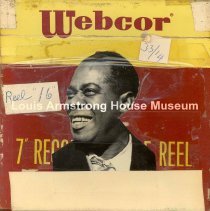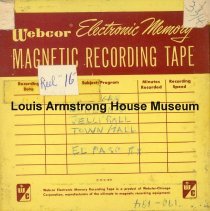Archive Record
Images


Metadata
Catalog Number |
2003.197.18 |
Title |
[Reel-to-reel tape recorded by Louis Armstrong] |
Object Type |
Tape |
Collection |
Satchmo Collection |
Description |
Scope: Louis listens to and comments on Jelly Roll Morton's Library of Congress recordings. Recordings of a spanish radio station. Recordings of Louis Armstrong recordings (Town Hall concert, Victor sessions, 1929 date with Luis Russell) with commentary from Louis. Louis and C. C. Morgan tell stories. Originally cataloged in ”Tape Catalog #2, Part 1” (see Manuscripts, 1987.2.23). Tape box decorated with a photograph of Louis. Contents (as on compact disc reference copy): Disc 1, Track 1: Louis Armstrong, a self-described "New Orleans boy," introduces Jelly Roll Morton's Library of Congress recordings on Circle. "Whatever Jelly Roll says about the good old days in music, he--a pioneer along with grand people such as Joe Oliver, Bunk Johnson, Manuel Perez, Freddie Keppard, oh, I can call them for hours-you want to just listen to him. He's the boy who played in Lulu White's Mahogany hall. So anybody knows anything about jazz at all, I think Jelly Roll can tell you. What he says, lend an ear. Dig this." Track 2: "At the Animule Ball" (Jelly Roll Morton); Track 3: Jelly Roll Morton talks; mentions "Winin' Boy Blues"; "Animule Dance"; talks about scat songs and how he was doing this "way before Louis Armstrong's time"; mentions how some people think Louis Armstrong, "one of my hometown boys," invented it but Morton "must take the credit away" and give it to Joe Sims, who Morton claims was an old comedian who was the first person who ever did it "in history"; Tony Jackson and Jelly Roll followed; Morton demonstrates scatting; Track 4: Louis pauses the tape and explains the situation about scat; "I don't think I'll let you get away with this," Louis says; Louis talks about dropping the paper during the recording of "Heebie Jeebies" and how he didn't even know Jelly Roll at that time; Louis says he never heard the word "scat" in New Orleans and that it was never used until after "Heebie Jeebies"; "Whatever you claim, I don't claim," Louis says; Louis talks about how he didn't meet him until he was in Chicago; "When you got to Chicago, young man, everything had been done before. So I just want to make a little correction because after all, I'm still in the business and you're six feet in the ground, young man."; Track 5: Jelly Roll Morton talks; Track 6: "See See Rider" (Jelly Roll Morton); Track 7: Louis listens to the radio in South America, November 1957. "Poor Butterfly" (unknown Spanish singers); Track 8: South American radio announcer introduces the program in Spanish; Track 9: Unidentified Spanish song sung by a female trio (Louis has written "Swing Tune" and "Girl Trio - (Sing beautiful) in his tape catalog); Track 10: Spanish announcer introduction; Track 11: "Cielito Lindo" (same female trio); Track 12: Spanish announcer says "Buenos Dias"; Track 13: Closing theme ("Besame Mucho"); Tracks 14-15: Unidentified Spanish selections (unknown Spanish male vocalist); Track 16: Short song in Spanish followed by announcer (commercial?); Track 17: "La Mujer de Mi Vida" [?] (sung by unknown Spanish man); Track 18: Short song in Spanish followed by announcer (commercial?); Track 19: "Mi Vida" [?] (sung by unknown Spanish man); Track 20: Silence; Track 21: "There's No Place Like Home"; announcer speaks in Spanish; unidentified selection (sung by unknown Spanish woman); Track 22: Spanish announcer introduction: Track 23: "We Three (My Echo, My Shadow and Me)" (in Spanish); Disc 1, Track 1: Louis in his hotel room in Denver, Colorado introducing an album of recordings from his Town Hall concert on May 17, 1947. Louis reads the album title, the personnel and the songs; Track 2: "Ain't Misbehavin'" (last chorus only); Track 3: "Back O'Town Blues"; Track 4: "St. James Infirmary"; Track 5: "Pennies from Heaven"; Track 6: "Save It Pretty Mama"; Track 7: Louis cheers the music and wraps up the recording; turns the tape over to Lucille Armstrong, sitting there reading a story Louis wrote concerning his trip to Honolulu titled "Satchmo in Hawaii"; Track 8: "Kiss of Fire" (Georgia Gibbs); Track 9: "A Lasting Thing" (Georgia Gibbs); Track 10: "Kiss of Fire" (Georgia Gibbs); Tracks 11-12: Two unidentified selections in Spanish (Louis wrote "Foreign Numbers (Pretty)" in his tape catalog; Track 13: "Indian Love Call" (Louis Armstrong and Gordon Jenkins); Track 14: Louis tells the story about writing "Someday You'll Be Sorry" in North Dakota; Track 15: "Someday You'll Be Sorry" (Louis Armstrong, 1947 Victor recording); Louis mentions he likes the last part and after the record ends, replays the final minute; Track 16: Louis sings the end of the record a cappella, saying, "That kills me, Jack!" Louis turns the record over and introduces "Fifty-Fifty Blues" on Victor; says so long to Doc Pugh, getting ready to "scarf" and go out to Jackson Beach; mentions C. C. Morgan has fixed him red beans and rice; Track 17: "Fifty-Fifty Blues" (Louis Armstrong); Track 18: Louis introduces the next recording (speaking to "the folks"), saying it comes from C. C. Morgan's collection and that he wants Morgan to introduce it; he calls for Morgan but he's busy, so Louis goes on with the introduction of the next song, his original 1929 version of "I Can't Give You Anything But Love" (mentions Luis Russell, J. C. Higginbotham, Henry "Red" Allen and Bill "Bojangles" Robinson); Track 19: "I Can't Give You Anything But Love"; Track 20: Louis calls C. C. Morgan over and asks him to tell his story; Morgan tells a story about when he was playing baseball with a team from Birmingham, Alabama, his team played a white Elks team in Pittsburgh; when they lost to the white team, the Elks played Louis's recording of "(What Did I Do to Be So) Black and Blue" as Morgan's team left the park; they followed it with "Shine," which disgusted Morgan, though he and Louis laugh hilariously at it; Louis says he must put that in his autobiography; Morgan mentions that he's lifelong friends with Shelton "Scad" Hemphill; Louis says Tallulah Bankhead is going to get a kick out of hearing this story because she's from Alabama; Morgan calls her a "great woman" and Louis talks about how much he admires her ("She treats everybody swell"); Louis makes a joke that he has a nephew named "Blockhead"; Track 21: "(What Did I Do to Be So) Black and Blue" (Louis Armstrong); Track 22: Louis talks about "Black and Blue," saying it was from Connie's Hot Chocolates in 1929, written by Fats Waller, Andy Razaf and Harry Brooks; "Gee, what a show that was," Louis says, before talking about his featured on stage with "Ain't Misbehavin'"; mentions Broadway stars such as Joe Frisco and Al Jolson coming in to see him perform that at the midnight show each night; Louis reads the personnel of "Black and Blue" and sings the praises of Gene Anderson and Jimmy Strong. |
Notes |
The material on this tape is from the 1950s but the tape itself was cataloged and the box was decorated in 1970-1971. |
Tape Information |
Reel 16 according to ”Tape Catalog #2, Part 1” (see Manuscripts, 1987.2.23) |
People |
Allen, Henry Anderson, Gene Armstrong, Lucille Wilson Brooks, Harry Frisco, Joe Gibbs, Georgia Higginbotham, J. C. Jackson, Tony Jenkins, Gordon Johnson, Bunk Jolson, Al Keppard, Freddie Morgan, C. C. Morton, Jelly Roll Oliver, King Perez, Manuel Pugh, Hazes "Doc" Razaf, Andy Robinson, Bill Russell, Luis Sims, Joe Strong, Jimmy Teagarden, Jack Waller, Fats White, Lulu |
Search Terms |
Chicago Connie's Hot Chocolates Hawaii New Orleans South America Town Hall |
Year Range from |
1969 |
Year Range to |
1971 |
Creator |
Louis Armstrong |
Caption |
2003.197.18 Front |
Accession number |
2003.197 |
